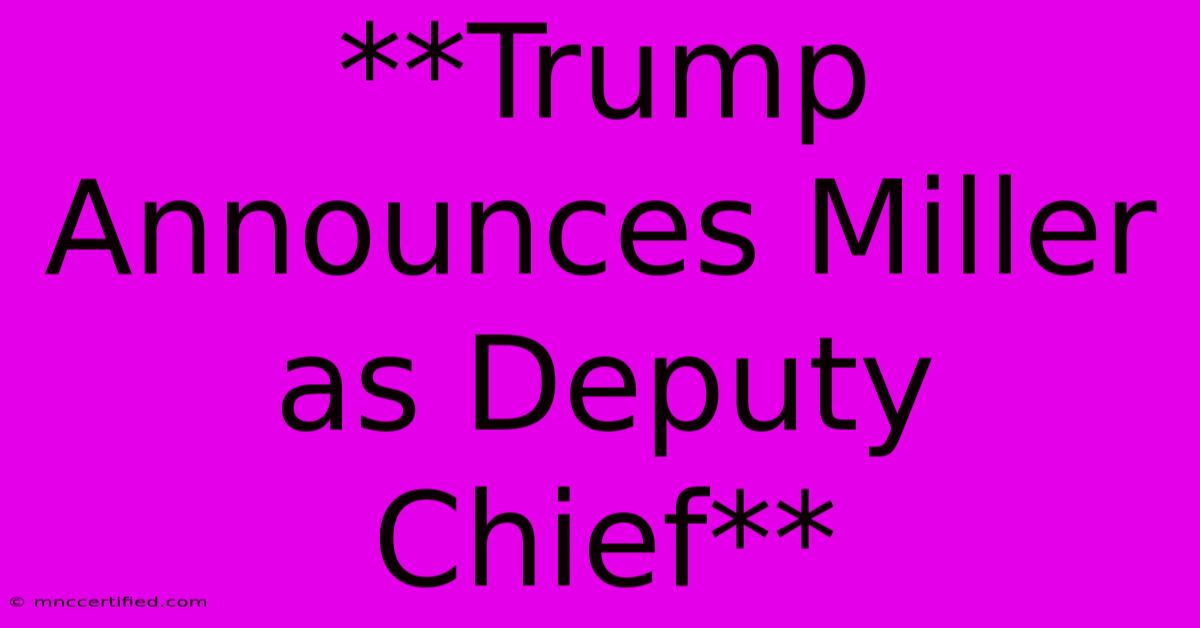**Trump Announces Miller As Deputy Chief**

Table of Contents
Trump Announces Miller as Deputy Chief: A Controversial Choice Sparks Debate
On [date], President Donald Trump announced the appointment of Stephen Miller as his Deputy Chief of Staff, a move that immediately ignited controversy and renewed scrutiny of the White House's political strategy. This appointment, coming amidst a period of turbulent political climate, raises questions about the administration's priorities and the potential impact on policy direction.
Miller's Background and Influence
Stephen Miller, known for his hardline stance on immigration and his role in crafting the administration's restrictive policies, has been a controversial figure since his entry into the White House. He has served as a senior advisor to President Trump since the early days of the campaign, playing a key role in shaping the administration's messaging on issues like immigration, trade, and national security. Miller's influence on the president's policies has been widely documented, with many commentators attributing his hawkish views to the administration's increasingly nationalist approach.
The Controversy Surrounding the Appointment
The appointment of Miller as Deputy Chief of Staff has been met with strong opposition from both Democrats and some Republicans. Critics argue that Miller's history of inflammatory rhetoric and controversial policy proposals make him unfit for such a high-ranking position. They point to his role in drafting the travel ban targeting Muslim-majority countries and his support for the separation of families at the border as examples of his extreme views.
Supporters of the appointment, however, argue that Miller's experience and policy expertise make him a valuable asset to the administration. They emphasize his commitment to carrying out the president's agenda and his ability to navigate the complex political landscape of Washington.
The Implications for the Administration
The appointment of Miller as Deputy Chief of Staff is likely to have significant implications for the administration's policy priorities and its relationship with Congress. Miller's influence is expected to grow, potentially leading to a further shift towards a more nationalist and isolationist agenda.
The appointment has already sparked debate about the administration's priorities and its commitment to bipartisanship. It remains to be seen how this appointment will impact the administration's ability to advance its legislative goals and its relationship with the American public.
Key Takeaways
- The appointment of Stephen Miller as Deputy Chief of Staff is a significant development with potentially far-reaching consequences.
- Miller's history of controversial views and policy positions has led to criticism from both Democrats and some Republicans.
- The appointment is likely to have a major impact on the administration's policy agenda, potentially shifting it further towards nationalism and isolationism.
- The appointment has raised concerns about the administration's commitment to bipartisanship and its ability to navigate the complex political landscape of Washington.
This appointment is likely to be a defining moment for the Trump administration, setting the stage for further debate and shaping the political landscape for the remainder of the presidency.

Thank you for visiting our website wich cover about **Trump Announces Miller As Deputy Chief** . We hope the information provided has been useful to you. Feel free to contact us if you have any questions or need further assistance. See you next time and dont miss to bookmark.
Featured Posts
-
Tesla Stock Rallies On Musk Trump Tie
Nov 12, 2024
-
Archbishop Welby Under Pressure To Resign
Nov 12, 2024
-
400 Questions Investment Banking Pdf
Nov 12, 2024
-
Domestic Violence Queens Story Reviewed
Nov 12, 2024
-
Uk Pm To Join French Armistice Ceremony
Nov 12, 2024